6582 Results for “production”
-
“It’s Always About Time and Not Having It”: DP Greta Zozula on Summering

With Summering, James Ponsoldt wanted to make a film that his young daughter would appreciate, and the result is a coming-of-age story about four girls planning one final weekend of fun before middle school. They unexpectedly make a discovery in the nearby woods that they keep to themselves, and from there imagination and reality collide in magical realist fashion. Below, cinematographer Greta Zozula explains how she managed the narrative’s tension between magic and realism and how the crew managed to make difficult scenes work with limited time. Filmmaker: How and why did you wind up being the cinematographer of your film? […]
by Filmmaker Staff on Jan 22, 2022 -
“The Movie We Made Is Really Very Close to the Movie I Imagined”: Editor Darrin Navarro on Summering



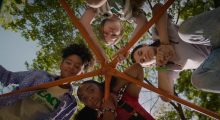
Summering is James Ponsoldt’s ode to childhood in which four girls who discover something in the woods and make a questionable decision to keep it a secret and solve the mystery on their own. The coming-of-age story also has elements of both horror and magical realism, and keeping close to the perspective of its characters while staying tethered to the reality was crucial for the film. Editor Darrin Navarro discusses striking that balance and how altering the structure of the film gave the audience a way into the narrative. Filmmaker: How and why did you wind up being the editor […]
by Filmmaker Staff on Jan 22, 2022 -
“Perhaps It’s a Miracle to Make Films” | Ricky D’Ambrose, The Cathedral

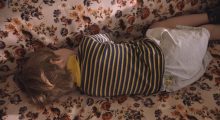
The last two years have prompted much contemplation and reconsideration of the reasons why we make our films as well as the ways in which we make them. What aspect of your filmmaking—whether in your creative process, the way you finance your films, your production methodology or the way you relate to your audience—did you have to reinvent in order to make and complete the film you are bringing to the festival this year? Filmmaking has always been, since my earliest childhood experiments with a camera, a circumscribed activity—typically thankless, fueled by begrudging favors and cut-rate fees, a marginal and […]
by Filmmaker Staff on Jan 22, 2022 -
“I Wanted to Restrict Lighting That Didn’t Feel Naturally Motivated”: DP Barton Cortright on The Cathedral

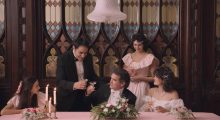
With The Cathedral, an unseen narrator relates the life of Jesse Damrosh, beginning with the dissolution of his parents’ marriage and highlighting other hallmarks of middle-class American existence. D’Ambrose lingers not on the big life events, however, but the more quotidian and quieter moments and objects that leave indelible marks on one’s memory. Cinematographer Barton Cortright explains why natural light was the correct approach for the film, and how he amplified the natural look to avoid a shallow depth of field. Filmmaker: How and why did you wind up being the cinematographer of your film? What were the factors and attributes […]
by Filmmaker Staff on Jan 22, 2022 -
“The Challenges We Had Were All Related to Nature”: DP Barbara Alvarez on Utama


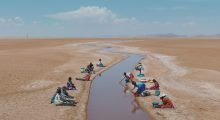
In Alejandro Loayza Grisi’s Utama, an ailing man tries to persuade his elderly Quechuan grandparents weathering a drought on the Bolivian Altiplano to move away from their lifelong home and join him in the city. Shot on location, the film portrays the daily routines and relaxed pace of life as well as the climate threat residents of the Bolivian highlands face. Below, cinematographer Barbara Alvarez recounts how the climate created difficulties in production and how she captured the tension between the harshness and the beauty of the location. Filmmaker: How and why did you wind up being the cinematographer of […]
by Filmmaker Staff on Jan 22, 2022 -
“Real Healing Means Taking All Our Vulnerabilities and Weaknesses and Realizing They’re Also the Source of Our Humanity” | James Ponsoldt, Summering




The last two years have prompted much contemplation and reconsideration of the reasons why we make our films as well as the ways in which we make them. What aspect of your filmmaking—whether in your creative process, the way you finance your films, your production methodology or the way you relate to your audience—did you have to reinvent in order to make and complete the film you are bringing to the festival this year? I think my focus sharpened. And my absolute need to make the film—I had to make it. So much of Summering is about children and their […]
by Filmmaker Staff on Jan 22, 2022 -
“The Silences, the Looks, Are What Mark the Emotional Rhythm”: Editor Fernando Epstein on Utama

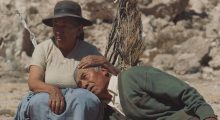
Utama, the feature debut by Alejandro Loayza Grisi, concerns an elderly Quechua couple urged by their grandson to move to the city while their native land is ravaged by drought. The pace of life and the experience of time are major themes in the film, and editor Fernando Epstein discusses how this necessitated creative ways of depicting routine and delaying the introduction of a major character. Filmmaker: How and why did you wind up being the editor of your film? What were the factors and attributes that led to your being hired for this job? Epstein: I am Uruguayan, and […]
by Filmmaker Staff on Jan 22, 2022 -
“The Reason I Make Films Has Been Reinforced by the Pandemic” | Alejandro Loayza Grisi, Utama



The last two years have prompted much contemplation and reconsideration of the reasons why we make our films as well as the ways in which we make them. What aspect of your filmmaking—whether in your creative process, the way you finance your films, your production methodology or the way you relate to your audience—did you have to reinvent in order to make and complete the film you are bringing to the festival this year? Among all the ways people had to live during the pandemic, mine was undoubtedly one of the privileged ones, and I feel grateful for how lucky […]
by Filmmaker Staff on Jan 22, 2022 -
“In That Lack of Motion I Found a New Way of Working” | Sophie Hyde, Good Luck to You, Leo Grande



The last two years have prompted much contemplation and reconsideration of the reasons why we make our films as well as the ways in which we make them. What aspect of your filmmaking—whether in your creative process, the way you finance your films, your production methodology or the way you relate to your audience—did you have to reinvent in order to make and complete the film you are bringing to the festival this year? Being at home. I’ve always been based here on Kaurna land in Adelaide, South Australia. I have lived and worked from here my whole life. And […]
by Filmmaker Staff on Jan 22, 2022 -
“We Were Finding Ways to Make Daylight Beautiful and Intimate”: Editor Bryan Mason on Good Luck to You, Leo Grande



Sophie Hyde’s Good Luck to You, Leo Grande takes place largely in a hotel room, where a retired schoolteacher determined to finally have good sex meets with a sex worker several times over the course of six weeks. Cinematographer Bryan Mason discusses how he varied the film’s style as the two get to know each other and the difficulties associated with shooting a film about sex that takes place largely during the daytime. Filmmaker: How and why did you wind up being the cinematographer of your film? What were the factors and attributes that led to your being hired for this job? […]
by Filmmaker Staff on Jan 22, 2022
